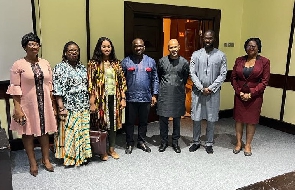 Members of the Gambia Chamber of Commerce and Industry
Members of the Gambia Chamber of Commerce and Industry
The Gambia Chamber of Commerce and Industry has held consultative meetings on trade in cultural goods in Ghana. Trade in handicrafts, artefacts and other traditional goods and services have a role in enhancing and benefiting tourism. Investing in the cultural goods sector where there is not much competition will boost resources coming into countries. This was highlighted at a consultative meeting held between delegates from the Gambian Chamber of Commerce and Industry (GCCI) and representatives of the Multilateral, Regional and Bilateral Department of the Ministry of Trade and Industry, (MOTI) Ghana. According to Mr Mickson Opoku, the team leader and Chief Negotiator for MOTI, Trade in cultural goods and services are lucrative sectors but often overlooked by governments in economic development so few resources are given to it. The Ghana Ministry of Trade is set to improve the traditional sector when it involves promoting Tourism or Culture as trade. That is why MOTI has come up with policies and programs to support the Creative Industry. Mr Gibriel Bah, the Project Consultant and Mrs Sarata Conateh, the CEO of the Gambia Chamber of Commerce and Industry, who was the Head of the Gambian Delegation, reiterated the importance of the Cultural Goods and Arts sector to small tourist destination economies like the Gambia and also other sectors such as traditional sports including traditional wrestling for which the Gambia is well known. As a result, it is important that dialogue, sharing of best practices and experience is shared amongst practitioners There is a need to take advantage of ECOWAS Protocols under the Economic Partnership Agreement (EPA) and also the African Continental Free Trade Area to develop quality Standards in the Craft and Arts business to promote its exports and growth. Consultative meetings were also held with the Faculty of Arts, the Center for Cultural Studies and the Integrated Rural Arts and Industry (IRAI) departments of the Kwame Nkrumah University of Science and Technology, (KNUST). The delegation discussed collaboration with KNUST where experts within the Dept of Arts and Cultural studies will provide technical assistance and knowledge transfer to institutions in the Gambia to improve the quality of handicrafts being produced by the artisans. This will add a huge value to cultural products making them competitive trade goods both for ECOWAS and the world market. The initiative is part of a European Commission-sponsored project to support the growth of the Culture and Arts Industries in The Gambia and across West Africa to facilitate the exports of African Cultural Goods into the EU market.
The Gambia Chamber of Commerce and Industry has held consultative meetings on trade in cultural goods in Ghana. Trade in handicrafts, artefacts and other traditional goods and services have a role in enhancing and benefiting tourism. Investing in the cultural goods sector where there is not much competition will boost resources coming into countries. This was highlighted at a consultative meeting held between delegates from the Gambian Chamber of Commerce and Industry (GCCI) and representatives of the Multilateral, Regional and Bilateral Department of the Ministry of Trade and Industry, (MOTI) Ghana. According to Mr Mickson Opoku, the team leader and Chief Negotiator for MOTI, Trade in cultural goods and services are lucrative sectors but often overlooked by governments in economic development so few resources are given to it. The Ghana Ministry of Trade is set to improve the traditional sector when it involves promoting Tourism or Culture as trade. That is why MOTI has come up with policies and programs to support the Creative Industry. Mr Gibriel Bah, the Project Consultant and Mrs Sarata Conateh, the CEO of the Gambia Chamber of Commerce and Industry, who was the Head of the Gambian Delegation, reiterated the importance of the Cultural Goods and Arts sector to small tourist destination economies like the Gambia and also other sectors such as traditional sports including traditional wrestling for which the Gambia is well known. As a result, it is important that dialogue, sharing of best practices and experience is shared amongst practitioners There is a need to take advantage of ECOWAS Protocols under the Economic Partnership Agreement (EPA) and also the African Continental Free Trade Area to develop quality Standards in the Craft and Arts business to promote its exports and growth. Consultative meetings were also held with the Faculty of Arts, the Center for Cultural Studies and the Integrated Rural Arts and Industry (IRAI) departments of the Kwame Nkrumah University of Science and Technology, (KNUST). The delegation discussed collaboration with KNUST where experts within the Dept of Arts and Cultural studies will provide technical assistance and knowledge transfer to institutions in the Gambia to improve the quality of handicrafts being produced by the artisans. This will add a huge value to cultural products making them competitive trade goods both for ECOWAS and the world market. The initiative is part of a European Commission-sponsored project to support the growth of the Culture and Arts Industries in The Gambia and across West Africa to facilitate the exports of African Cultural Goods into the EU market.